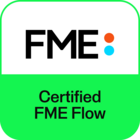Hi,
I am new with JSON. I am actually fetching dats using HTTPCaller and saving the output in csv format. I have used Creator-HTTPCaller-JSONValidator-JSONFormatter-JSONFlattener-Writter(csv). Everything seems correct till formatter, but when I use flattener, the elements are not getting exploded in the csv output or even inspector.











